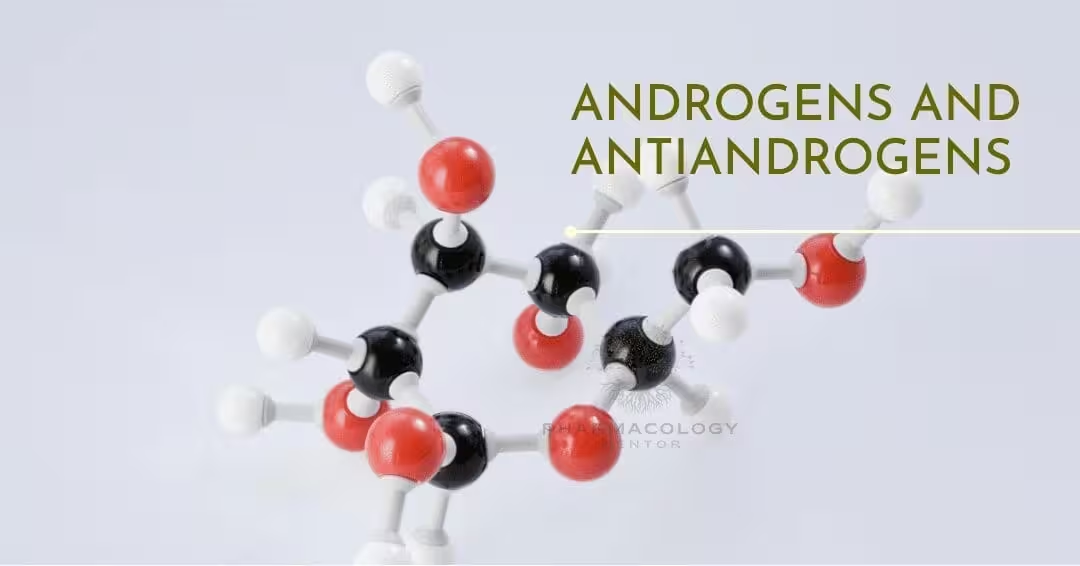Androgens are steroid hormones that promote the development and maintenance of male sex characteristics. The principal naturally occurring androgens in humans are testosterone and dihydrotestosterone (DHT), both synthesized mainly in the testes and, to a lesser extent, the adrenal cortex. Androgens bind to intracellular androgen receptors (AR), acting as transcription factors to regulate gene expression and drive differentiation, anabolic effects, and reproductive function.
| Main Androgen | Source | Action | Potency |
|---|---|---|---|
| Testosterone | Testes, adrenal | Primary male hormone; converted to DHT and estradiol | Moderate |
| Dihydrotestosterone (DHT) | Peripheral conversion by 5α-reductase | Key for external genitalia, prostate, hair follicles | High |
Therapeutic and clinical uses:
- Male hypogonadism
- Delayed puberty in males
- Anemia (rare, now replaced by other agents)
- Catabolic states/sarcopenia, osteoporosis
- Gender-affirming therapy in transgender men
Adverse effects: Acne, fluid retention, gynecomastia (via aromatization to estrogen), liver toxicity (oral forms), masculinization/feminization, lipid changes, cardiovascular risk, behavioral changes.
Antiandrogens: Classification, Mechanism, and Use
Antiandrogens are agents that block the effects of androgens either by inhibiting androgen synthesis, antagonizing androgen receptor activity, or inhibiting androgen activation/conversion.
| Class / Example | Mechanism | Common Indications |
|---|---|---|
| Androgen receptor (AR) antagonists | Block AR directly | Prostate cancer, hirsutism, acne, CAH |
| Steroidal: cyproterone acetate, spironolactone | Block AR; some also anti-gonadotropic, progestogenic effects | Hirsutism, BPH, prostate cancer |
| Non-steroidal: flutamide, bicalutamide, enzalutamide, apalutamide, darolutamide | Block AR, pure antagonists | Prostate cancer, feminizing therapy |
| 5α-reductase inhibitors | Block conversion of testosterone to DHT | BPH, male-pattern hair loss |
| finasteride, dutasteride | Inhibit DHT in prostate/hair | BPH, androgenetic alopecia |
| GnRH analogs/antagonists | Decrease LH/FSH, lower androgen synthesis | Prostate cancer, precocious puberty |
| Androgen synthesis inhibitors | Impair testicular/adrenal synthesis (e.g., ketoconazole, abiraterone) | Advanced prostate cancer |
Additional uses: Treatment of hypersexuality, paraphilias, PCOS, precocious puberty in boys, transgender feminizing therapy, neurological disease, anabolic steroid abuse.
Clinical Applications Table
| Drug/Class | Primary Uses | Side & Limiting Effects |
|---|---|---|
| Flutamide, bicalutamide | Prostate cancer (combined w/ GnRH manipulation) | Hepatotoxicity (flutamide), GI upset, gynecomastia, sexual dysfunction |
| Enzalutamide, apalutamide, darolutamide | Advanced/metastatic prostate cancer | CNS effects (seizures), fatigue, cardiovascular risk, hot flashes |
| Cyproterone acetate | Hirsutism, severe acne, BPH, transgender therapy | Gynecomastia, menstrual disturbance, risk of depression, liver toxicity |
| Spironolactone | Hirsutism, acne, hypertension, heart failure | Hyperkalemia, gynecomastia, menstrual irregularities |
| Finasteride, dutasteride | BPH, androgenic alopecia | Sexual dysfunction, decreased libido, gynecomastia |
| Abiraterone | Metastatic prostate cancer | Mineralocorticoid excess, liver toxicity |
Key Points and Clinical Pearls
- Antiandrogens are essential for prostate cancer management—often as part of “combined blockade” with androgen deprivation therapy.
- 5α-reductase inhibitors are first-line for BPH and male-pattern hair loss but do not treat prostate cancer.
- Cyproterone acetate and spironolactone commonly used for hirsutism in women and transgender therapy.
- Enzalutamide/apalutamide/darolutamide represent next-generation AR antagonists with improved prostate cancer efficacy.
- All antiandrogens can induce symptoms of hypogonadism and should be monitored for metabolic, bone health, sexual, and psychiatric effects.
References
- Goodman & Gilman’s The Pharmacological Basis of Therapeutics. 14th ed. New York: McGraw-Hill; 2022.
- Androgens and antiandrogens. StatPearls [Internet]. 2025 Jan 5.
- Selective androgen receptor modulators (SARMs). Drug Discov Today. 2007 Feb;12(3–4):141–151.
- Antiandrogens – LiverTox. NCIB Bookshelf. 2014 Jun.
- Sciarra F. Antiandrogens: clinical applications. Int J Androl. 1990;13(1):1–19.
- Antiandrogen. Wikipedia. Feb 2003.
📚 AI Pharma Quiz Generator
🎉 Quiz Results
Medical Disclaimer
The medical information on this post is for general educational purposes only and is provided by Pharmacology Mentor. While we strive to keep content current and accurate, Pharmacology Mentor makes no representations or warranties, express or implied, regarding the completeness, accuracy, reliability, suitability, or availability of the post, the website, or any information, products, services, or related graphics for any purpose. This content is not a substitute for professional medical advice, diagnosis, or treatment; always seek the advice of your physician or other qualified health provider with any questions you may have regarding a medical condition and never disregard or delay seeking professional advice because of something you have read here. Reliance on any information provided is solely at your own risk.

